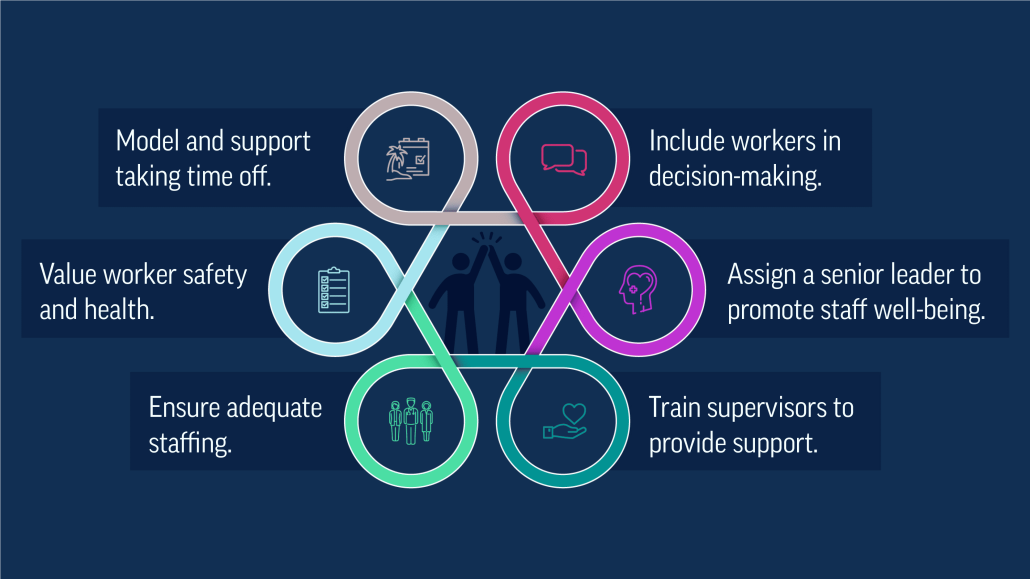The mental health of everyone on your team is important to your organization as a whole. If you’re a supervisor, or you over see leaders at your agency, make it a priority to find ways to boost the mental wellness of your community health worker (CHW) teams.
The CDC states in a recent survey that workers report harassment, burnout and poor mental health. The study shows that in 2022:
- More than twice the number of health workers reported harassment at work
- Almost 50% of health workers reported feeling burned out
- Nearly half of health workers intended to look for a new job

Why CHWs Feel Overwhelmed
CHWs, along with other health workers in the U.S., have demanding and sometimes dangerous jobs. They can be exposed to infectious diseases, violence from clients and community members. The COVID-19 pandemic has created plenty more stressors.
What’s more, CHWs create strong bonds with clients and report that they feel fulfilled by their jobs. However, CHWs are often called on to respond to mental health crises, but they might not have the training to handle it. They could be overworked and become discouraged when a relationship they build with a client ends. When they take on too much, they run the risk of depression, anxiety, burnout and compassion fatigue. When their mental wellness is at risk, so is your program.
“CHWs are often lauded for their ability to develop trust with peers, yet this willingness and ability to create enduring emotional bonds could threaten programme delivery,” says a study published in BMC Health Services Research.
In fact, community-based health workers are more likely to have problems with depression and mental health issues than the other members of their health care team.
Supervisor Training Gaps
Supervisors can absolutely help with this. But they don’t always know how. In developing a leadership training program for CHWTraining, we immediately noticed some troubling trends:
- Supervisors lack general training for managing teams of CHWs.
- Supervisors lack training for dealing with mental wellness issues among their staff.
- Many programs have few resources for supporting either supervisors or their staff.
Burnout, Depression and Anxiety Warning Signs
The first step is to be able to know what burnout, depression and anxiety look like. If you work in a close team, you might be able to easily tell if someone is feeling undue stress. In our training, we flag these as some of the items to look for if you suspect someone needs help:
- Sleeping too much or not enough
- Sudden weight loss or gain
- Avoiding people and activities
- Smoking or drinking more, or using drugs
- Mood swings
- Apathy and calling in sick to work
Clearly, there’s a training and support gap that needs to be addressed. In the CDC study and elsewhere, workers say they have fewer mental health issues when they said they work in supportive environments. Here’s how you or your leadership team can better support your team.
Support Strategies for Supervisors

1. Start Before Problems Begin
One of the best things you can do is look out for any warning signs. But it’s even more effective to help your team avoid these dangers in the first place. Not only will you prevent any problems, but problems are much harder to address when they’ve already happened. Be proactive about the mental health of your team.
Make sure that supervisors have the training to provide support so they can offer it when needed.
2. Listen Up
If you’re not sure if one of your CHWs is starting to feel the pressure of their job, listen. Be the kind of manager who is willing to listen to work-related issues. This gives employees the sense that they can come to you when they need to share. If they don’t volunteer information, make a habit of asking.
Similarly, encourage teamwork and bonding among the team. If you’re not there to lend an ear, someone else who understands the unique nature of being a CHW can provide a sympathetic ear.
3. Burn off Stress
At the top of the list is burning off stress. Organize informal picnics or potlucks with your team, so you’re connecting with each other in a way that’s not all about work. Or suggest walking meetings to recharge, as they do at Berkeley County School District, Moncks Corner, S.C.
Some organizations provide a mindfulness space to encourage relaxation or meditation. See if you can assign a room as a place where your staff can stop feeling overwhelmed. If you don’t have space or have a workforce that isn’t in a room together, encourage them to sit at their desk quietly, noticing their body’s sensations as they sit.
4. Mental Health Days
Your program should also offer mental health days as part of a benefits package. However, you should also suggest your staff take advantage of them. This can help CHWs realize that you support their mental wellness and that they can feel comfortable asking for time when they need it. Same goes for vacation time.
5. Model Healthy Habits
Supervisors and other leaders can show their team what good mental health habits look like. Setting a positive example can be contagious. They can prioritize self-care, like exercise, or setting boundaries between home and work life. Then, they can promote the same habits among their team.
6. Assign a Mental Health Leader
You can also assign one person on your team to be the go-to person for any mental health questions or issues. This can have a wide-reaching affect on team morale and productivity. Find a senior leader who has a real interest in employee well-being and make sure they have access to all the resources and budget they need to carry out the role.
So, would you like to learn more?
Join us as we discuss improving your team’s mental wellness, identify signs that an employee is at risk for depression, anxiety, or secondary trauma, and show you how you can help your team improve their personal and professional lives.

